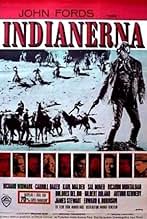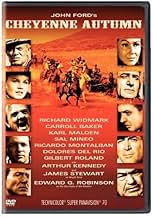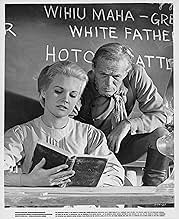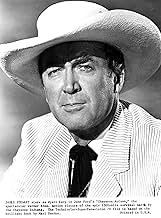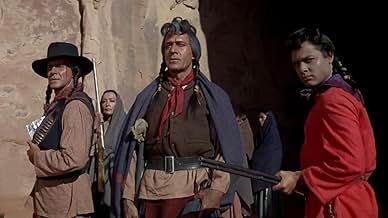When I saw this during its first release, I was, like most other viewers, thoroughly awed by William Clothier's magnificent handling of the 70mm cameras (although some scenes, unfortunately, had to be completed with quite evident manipulation of actors performing on a soundstage in front of previously photographed exterior shots, and some sets were much-too-obviously studio bound.) The casting of non-Native Americans didn't surprise me then, though I might now reluctantly join the ranks of those who would prefer otherwise. However, then we would miss Victor Jory, Sal Mineo, Gilbert Roland, Ricardo Montalban and the beautiful Dolores del Rio playing their roles with the requisite dignity and professional aplomb. Carroll Baker gives poignancy to her portrayal of a young Quaker woman, true to her convictions, and Richard Widmark and Edward G. Robinson enact Americans with a conscience, none too happy with the assignments required by their government. Karl Malden, as the brutal Capt. Wessels, doesn't beg for our forgiveness, to say the least. But I will agree with those who find the James Stewart sequence a jarring contrast to the presumed thrust of the narrative.
My own take on that is the otherwise surprising absence of John Ford's customary over-reliance on sentimentality in this particular enterprise. At the very least when he made a movie with a setting in the Old West, he usually insisted upon using folk songs, sometimes ad nauseum, as background (and foreground) musical accompaniment, but here the very sophisticated Alex North is credited with the musical score, and its bitter strains are not at all typical of a John Ford production. I do not know if Mr. North was assigned to this project against Mr. Ford's preference, but that noted composer's contribution (He was nominated fourteen times for an Academy Award, though not for this one.) is one of his best and most appropriate accomplishments, to my ears. Except for his uncredited work on "Young Cassidy" and the truly atypical "Seven Women" starring Anne Bancroft which followed this major screen opus, John Ford made a final bow here that may not be his best but which unquestionably bears the mark of a master of the cinema.



